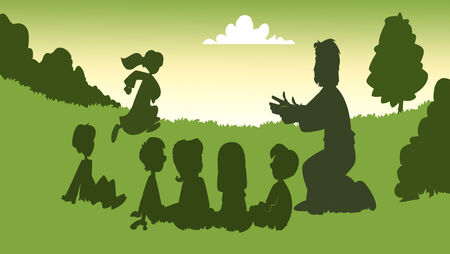
Even God Rested
Bible Verse
2 By the seventh day God had finished his work, and so he rested. 3 God blessed the seventh day and made it special, because on that day he rested from his work. Genesis 2:2-3
Young children have a unique ability to take long pauses over the tiniest of details in their world. Each day holds a collection of new, never-before-seen, -touched, -smelled, -tasted, -heard experiences. When my kids were toddlers, it could sometimes take us an hour to walk the tiny horse-shoe-shaped street of our neighborhood. I experienced the cracked sidewalks, usual houses, and barking dogs the same way every time. In my mind, our daily jaunts were something to do to pass the time. To my three kids, though, those walks held mystery and fascination. A ladybug! A special stick! A river to throw stones in! Somebody’s chalk art! What seemed like repetitive minutia to me captivated them.
Resting feels counter-cultural. Whether you work a high-intensity job, spend your days mopping up messes and keeping the kids alive, or—like many parents—deftly juggle both roles, you know that the hustle is real. The author of Genesis likely could not have imagined the high-tech, fast-paced world we live in today. And yet, the words of the creation story in Genesis 2 still feel fresh, even novel.
God rested. Could you pause a moment and let that sink in? The Creator of our universe rested. And when he did, he shifted his attention from working to appreciating. He paused to call it good.
Recently, I saw a post on Instagram that, though well-intended, turned rest into yet another task with a set of how-to directions for parents. I laughed at the irony. “Here’s how to be the best rester you can be!” it seemed to shout. “Hurry up and try it!” it said.
But Jesus gave simple instructions: “Come to me,” he said, “and I will give you rest” (Matthew 11:28). What does Christ-gifted rest look like? It often means embracing an inner, spiritual rest God gives through his Holy Spirit. In practice, that could involve rejuvenating activities—reading Scripture, praying, sharing a meal, lounging on the beach, taking a hike—or it could mean doing nothing. Regardless of how we rest, we enjoy its benefits of stillness, connection, and gratitude.
Families need times of rest. Can we follow the example of our littlest family members? When we slow down and take notice of God’s world, we experience more fully what young children seem to intuit without any prompting. We experience what our Creator made us for—enjoying and glorifying him and the good things he made.
My kids are older now—learning to drive, playing sports, meeting friends. The hustle feels endless. Still, they remember afternoons we spent under the shade tree in our front yard, reading books until we nodded off for an impromptu nap. They remember scaling the limbs of their favorite trees, taking in their world from a new vantage point.
These days, resting often requires our family to turn down opportunities for meaningful activities. It means ignoring a little FOMO from time to time. My kids are often better at this than I am. I didn’t know it then, but letting them take their time when they were little means they experienced from a young age the gift of slowing down to enjoy their Creator and his world. I’m grateful for that.
Want to do a deep dive? Check out Family Fire's article Cultivating Rest as a Family.



